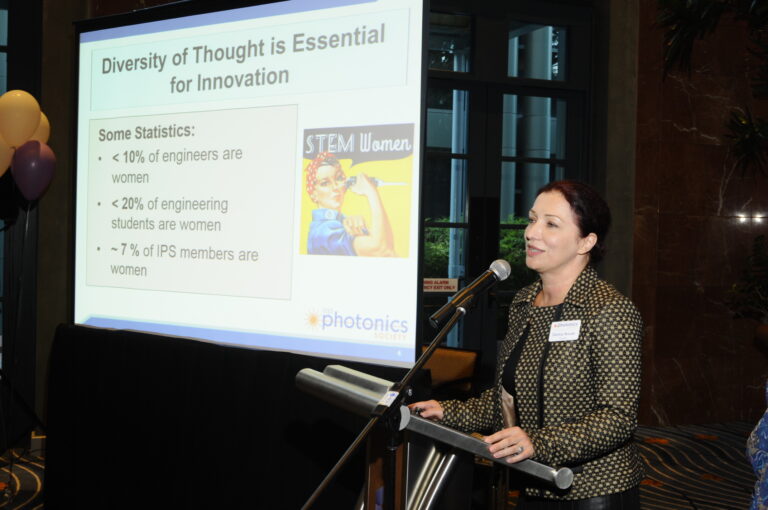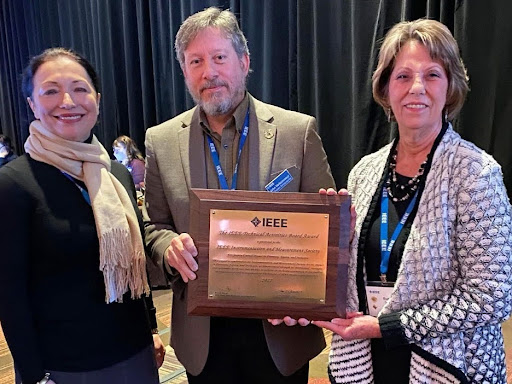By Fred Schindler, IEEE Technical Activities Vice President, 2024

IEEE came into being in 1963 with the merger of AIEE and IRE. Both of those organizations were founded by leaders in industry. AIEE was founded 140 years ago by the likes of Edison, Tesla, Thomson, and Weston. Alexander Graham Bell served as an early president. IRE was founded in 1912 by leaders in the evolving wireless telegraphy industry.
We were founded by industry leaders. So, what happened? We’ve seen a decline in industry engagement for decades. Our efforts to improve industry engagement have yielded limited results.
My own career experience highlights the change in industries’ connections to IEEE. My first involvement with IEEE, as was for many, was with conferences. That was in the 1980s. I started as a reviewer before moving on to other roles. I was working for a large defense contractor at the time. My employer encouraged and supported my involvement. It was important for the company to be represented. As I progressed through my career and roles in IEEE, what started as support from employers by 2000 declined to what would best be called tacit acceptance.
By the late 2010s, my involvement in IEEE was barely tolerated. Many of our volunteers, especially younger ones, find employers no longer support their IEEE involvement. People take vacation time to participate in IEEE events. They pay their own way to attend or even contribute to our conferences.
Is it just a coincidence that was happening as the role of our technologies in society changed? A few decades ago, our technologies were useful in our lives. Today they are central to all we do in life. What happens if the electric power fails? What happens when there are shortfalls in the semiconductor supply chain? It’s hard to find products that don’t have our technologies in them, that don’t depend on our technologies in their manufacture or the logistics needed to get them to market. Have we been too successful?
The world’s largest companies have been built around our technologies. Economies depend on our technologies. That’s made for a more competitive environment. I know a CTO that doesn’t want his employees to review papers because the comments they make may betray proprietary information. Are some industries now compelled to avoid IEEE? Do they understand that we provide the foundations of their future products?
Industry still depends on our publications. Our standards activities are essential to the efficient implementation of advancements. We’ve been developing more training and education services and products. We provide opportunities for technology professionals to grow, network, and contribute to society in meaningful ways.
There is no one way to reengage with industry or with professionals working in industry. It’s not a monolith – different professionals and different industries will have different motivations to engage. So, let’s crowd-source it. We have 47 Societies and Technical Councils. We have even more technical initiatives and communities. We have 344 sections and innumerable chapters and student branches. Let’s leverage that along with our wide-ranging activities in standards, education, publications, conferences, humanitarian technologies, and public policy to reengage. It’s on all of us.
For the past several years, there has been a desire to strengthen IEEE’s engagement with industry. Our engagement with academia is strong, but most people working in technology-related fields are in industry. How can we advance technology for the benefit of humanity without them?






18 Responses
Fred, you are correct. It is not only IEEE which has been disengaged by industry. Othe organizations and employers have become indifferent to professional activities. With regard to IEEE specifically, the problem is that the organization has become too big, too broad, and too all-inclusive. The motto reads like “all things for everyone”. We should return our focus to electricity, radio, electronics, and computers — not “humanity” or “society” or political ideology. I have been a (senior) member since the IRE and watched IEEE grow up and away from me. Even the name of the institution should be changed back from “IEEE” to the original full wording, with “IEEE” being only an acronym.
Fred,
I have been an entrepreneur for the past 45 years. I was an IEEE member in college, but dropped the membership along the way. I find that other societies stay in frequent touch with their members, and get them involved. Their communications have a personal touch. IEEE on the other hand sends form letters that lack the personal touch. I can provide more detailed comments if we have an opportunity to speak at some point.
Mir Imran
Fellow, AIMBE, NAE, NAI
Bravo, Fred – a thoughtful and well written piece! Agreed that over the years there has been a shift from management in industry encouraging employees to serve as IEEE volunteers, to many now questioning the value to be involved. The IEEE too has changed. Many IEEE publications and conferences have gravitated toward researchers communicating with researchers, leaving industry practitioners wondering if they still have a seat at the table. Some Societies, Councils, sections and chapters have demonstrated vibrant strength engaging with businesses in industry and the practitioners serving as their employees. I believe these are successful because industry is their focus.
Thank you for addressing this too often neglected matter. During my 35 year career at Sandia National Labs, I had bosses who encouraged IEEE involvement while others discouraged it even though Bell Telephone Laboratories top management encouraged it. Recommendation #1: IEEE should encourage companies’, government labs’ and universities’ top management to take an explicit policy position toward IEEE which includes paying for IEEE membership and conference attendance. Those that endorse IEEE membership and involvement in IEEE to their employees should be offered group IEEE membership discounts, discounted conference attendance and other perks. Recommendation #2: IEEE should develop and offer free on-line tutorial teaching materials to student members in order to build a stronger bond between IEEE and students in anticipation of retaining these students as IEEE members after graduation. Recommendation #3: Build a family-friendly conference environment that encourages IEEE members to bring their families to conferences. There are many other things that IEEE can do to promote industry participation. I volunteer to serve on a committee devoted to addressing this issue. I have been general chair for conferences sponsored by NPSS and VTS and have been involved in many IEEE other activities, including IEEE Congressional Fellow over a 60 year career.
Yes, you bring up some points that are overdue in being discussed. I myself have seem that companies have become more protective of their engineers (some discourage conferences or sabaticals because they think that raises the chance of people to change companies). It is almost as if companies feel inadequate that they won’t be able to keep their employees.
Perhaps, 50-100 years ago there was a feeling that the pie was growing and most companies would expand at the same time, and now there is less overall growth and more competition. Companies seem to be like the parent who does not want to let their child play on the playgroud with others (maybe trade secrets will come out or their is a fear employees will be recruited away, etc).
From my view, the most useful thing about IEEE is the talks and conferences and journals:
*Keep encouraging chapters to have interesting talks, somehow encourage & subsidize it more. These are important!
*I didn’t like seeing the increased membership dues this year. Please try to minimize that.
*I wish I had more ideas, but that is all I can think of right now.
During the course of my career I worked in many different segments of industry doing project design and construction management along with maintenance relating to plant/facility power and process/machine control. This was mainly in the private sector but with my last 20% being with the Federal Government. Support for IEEE involvement, while mixed, was there the majority of the time. To my surprise, my segment of the Government was one employer that did not support my membership. This may be a major American employer that IEEE could lobby for greater participation.
One of the great benefits of IEEE, to me, is the Spectrum magazine. Its broad coverage of the many aspects of electrical engineering, as well as some articles that may not seem directly related to the field, keeps me interested as well as up-to-date of the developing technologies in our field. But, I have noticed, that articles relating to the types of work with which I was involved are almost nonexistent. While not as intriguing as superconductor plasma confinement or the latest exotic material for high- speed high-temperature integrated circuit development, the work done by electrical plant, facilities, and power system engineers keeps your new cars coming off the assembly line, the equipment working when you are having open heart surgery, or the tank of volatile chemicals from exploding in the tank farm that your children pass every day on their way to school. Much like the linemen working the downed power lines in the middle of a winter storm to get your power back on, the garbage men that collect your refuse to keep it from piling up at your home, and the water treatment technicians that keep your drinking water safe, these engineers are the forgotten workers in the trenches keeping everyone else safe, comfortable, and happy.
I see awards being given or documented in Spectrum relating to someone discovering new doping that increases PV cell efficiency by 1% or for a new cell phone technology making them more efficient in urban areas, but where are the awards for EE’s in industry that improved process controls on a production line that increased throughput, improved quality, and reduced cost? Is there even one given by IEEE engineers working in industry? A lack of visibility and recognition by IEEE to EE’s working in industry, as well as few articles/papers discussing equipment and technologies that may be of interest to them, may be a significant reason more engineers in industry do not participate or press their employers to be engaged with IEEE.
The article and the published comments leave out one important thing, who is running these industries? No longer are industries being run by people like our members, they are run by Lawyers, Accountants, people who are only trained managers, and Financiers. And even when a company is started by a technologist, a merger or two later and they put a MANAGER in charge. As someone already posted, all IEEE can do is continue addressing the the problem at the local level, vice the Corporate level,
Right you are. I use the restaurant analogy,… who do you get to run a restaurant, an MBA who counts every pea and carrot on the plate and every place setting on the table, or the person who knows food and hospitality? Answer,… the person who knows food and hospitality. You get the MBA to help them, not the other way around.
It’s like the difference between Carla Fiorina (HP) the MBA, verses Andrew Grove (Intel) Ph.D. in chemical engineering and chip engineer. Carla is not a tech person, Andrew was and was the right fit and person for the job. I think the world of Andrew and was great, I like Carla, but just wasn’t a good fit at HP. She’s better suited to be a market fund manager.
Every industry faces the point in time where they have wandered away from their core competency. IEEE is not an industry leader. They are an academic and science facilitator across a too broad spectrum of interest areas. While the Standards Association( I worked on a standard that took 4 years to finalize) has many standards that are industry recognized and adopted. How many of the standards in the IEEE inventory are industry adopted? The IEEE is a hoarder. You need to simplify your focus areas and drive the energy of your volunteers to things that matter to industry. Look at you executive leadership, it is largely academic. I worked on an Excom and I must say the process was tedious and ponderous. Retired or academics made up the committee. The IEEE needs to determine how they can be relevant to industry in the future and then see if that is something that can be done. Industry is moving so fast in these arenas that practically can the IEEE lead industry or will you be at best a theoretical round table providing good services but not be in the industries inner circle.
It’s about time! All the above remarks are long over due!
When I became a member, early back in the 1960`s, it was my company that paid my way. I had no money.
Their or there, is an old saying, that I remember; If allowed, “DO NOT GET TO BIG FOR YOUR BRITCHES!”
This is an excellent article on a topic that members have discussed for many years. In our section, industrial members have declined 26% over the last decade, while electrical engineering employment has grown 7.5% in our service area.
IEEE has done an excellent job of capturing academic members, as it provides a superior place to publish and network at conferences. Industrial members see decreasing value in being members, as few publish and find it challenging to participate in conferences. Recently, I was one of two industrial engineers at a conference.
I don’t accept the excuse that this membership decline is solely because employers are not paying for memberships. And the idea that encouraging employers to push IEEE membership will solve the problem is naive. We need to create value in our offerings, which are attractive to industrial engineers and make IEEE membership an essential part of their professional and personal lives.
This is a difficult task. It requires focus and commitment. But with our membership of educated individuals, we can make this pivot successful.
It also takes leadership—not just trite bylines and sound-good taglines, but a real drive—to successfully reengage industrial engineers. At a recent regional meeting, an IEEE official said this issue could threaten IEEE’s continued existence. If that is the case, why is it not the top objective?
If we believe that IEEE members can make a difference to humanity, it will not only through endless servings of technology but by creating a member-centric organization dedicated to advancing the success of its members…. all its members.
Well said, Richard. IEEE needs to focus on serving all its members.
I commend this article and the thoughtful responses to it. Although not an engineer, I have been an IEEE member and volunteer throughout most of my 50-year career. During that time industry involvement in IEEE has declined steadily, as has overall IEEE membership in the USA. This will not change, I believe, until IEEE offers a greater value proposition for members from industry. This will require a focused and sustained effort, led by volunteers who are, themselves, present or past employees of diverse industries.
This is an email I sent to Tom Coughlin (IEEE President) in response to his article in the September 2024 Spectrum about “Why Students Should Stay With IEEE”. I sent it to him about 2 weeks ago (before your article was published). My views, after 40 years in industry, align pretty much with yours. Amazing!
———————————————————————————————————————————————
It is with some reluctance that I write to you regarding your article in the September’s IEEE Spectrum. I appreciate your thoughts but have a hard time aligning with your view. The topic is one that John Meredith and I used to discuss for years – and never seemed to find a good answer.
First a little bit about myself so you can understand what has shaped my thoughts on this subject. I am a 77 year old retired electrical engineer (M.S.E.E. PE) having worked for IBM Federal Systems (25 years) and then Lockheed Martin Mission Systems (15 years after LM bought IBM’s FS division.) I was a chief engineer on mostly classified projects developing special operations helicopters and airplanes and satellite command and control systems (including GPS). 40-years in the trenches. I’ve never had a job in academia or as a consultant. I’ve been an IEEE member for 53 years. Why so long? Mainly for the term life insurance that IEEE offered when I had my first child.
I never took an active role in the IEEE until my later years for three reasons. And believe these reasons are common for 90% of engineers working in industry (excluding those working at the top echelons in research and marketing).
Job and Family Pressures: Job and family pressures took almost all of my time. We all struggle with trying to balance family and work. It’s a hard act. I’ve seen the struggle in many engineers throughout my career and in my son who is also an EE working in industry. My experience is most of us work 50+ hour weeks.
Lack of Industry Recognition for IEEE membership: In the 40 years that I worked never once did my performance plan, advancement and salary depend upon membership in the IEEE. Metrics always included on-time, on-budget and meets all technical requirements. And maybe mentoring. The salient point here is that industry does not encourage or value IEEE membership for the majority of its engineers. And money has always been very tight to send engineers to conferences or workshops or to publish papers (and you can forget classified talks, workshops or papers).
The IEEE has no name recognition outside of the IEEE. This point may be a little weak but lets explore it anyway. What do engineers do in their “spare” time excluding family and work? One possibility is joining formal organizations. There is pride and prestige in being a member of, and contributing to, a general public (and industry) recognized world class organization. Think about the America Medical Association, the National Academy of Sciences and Engineering, the National Football League, Certified Public Accountants. “Bob” the account temp has brought the CPA society more name recognition through TV adds then the IEEE has. Just a thought but would the IEEE get and retain more membership if through TV, radio and social media venues we told the story of how the IEEE members have advanced the standard of living for millions of people. I’ve never seen/heard an IEEE TV or a radio ad. Or maybe the IEEE should offer a yearly contest “To Advance Technology for Humanity” open to anyone world wide and which is widely promoted through advertising (and a big prize).
The other thing I would like to see is some validation of my life experience. it would be nice to know the percentage (and number) of electrical engineers in academia (publish or perish) that have IEEE membership and the same statistics for electrical engineers in industry (down in the trenches). A survey of IEEE members by age and based upon the thoughts in your article would also be helpful in giving us some very useful information to base a forward recruitment and retention action plan on.
This ends my thoughts on the subject. Believe me, I would like to see more students (and oldsters) join and become active in the IEEE. It is a worthy organization that accomplishes a great deal of goodness behind the scenes. And perhaps that’s the problem – it’s excellence, goodness and benefits to humanity need to be more widely recognized.
John Meredith was a good friend and a colleague at Hewlett Packard. He had a great way of telling me when I was full of beans, and needed to rethink my position on some issue. I miss him. He passed the day before our ground breaking “IEEE President’s Forum” in 2018. John was huge promoter of that forum and was tracking our organizational meetings from his hospital bed.
IEEE has the money and our members are intelligent individuals. We can create the value that is needed to re-engage Industrial engineers. It just takes a commitment to make it happen. Some would call it leadership.
Fred, I agree with you 100% from someone who spent their entire career in industry (defense and wireless telecom). I think one way to start getting industry participation again is to pair academic conferences with industry trade shows. A great example of this is the IEEE MTT-S IMS. I was able to attend this several years ago and was blown away by the scope of both the conference and the trade show. Another way is to increase continuing education training – webinars, short courses, white papers, etc. that are geared toward people in industry.
Thanks for the great article Fred. This topic is near and dear to my heart, and I think those of us in IEEE need to discuss it more.
With regard to IEEE SA specifically, I work in an area where companies recognize the importance of standards (time sync, as with IEEE 1588). The problem is that many people view IEEE SA as overly buraucratic, and those people look to non-SDOs (e.g., trade associations, consortiums, open-source projects), or SDOs that are perceived to be less bureaucratic (e.g., IETF).
Personally, I think IEEE SA’s core policies and procedures are essential and useful. A negative perception of bureaucracy occurs when policy work transitions from what is useful into the area of useless busy-work. The challenge I see is that full-time staff in IEEE SA’s office have been pushing more and more new busy-work on the volunteers. These IEEE SA staff have the best of intentions, but as with any increase in policy work, the result is perceived as bureaucracy. For example, in an hour long standard call, we can spend as much as 30 minutes on IEEE SA policy work, leaving 30 minutes for actual technical discussion. I cannot defend that sort of thing, and people are correct to leave IEEE SA because of it.
In any organization, the solution to bureaucracy is for key decision-makers to take a big picture view, and optimize the policies to trim back to what is truly useful. For example, in my view, an hour-long IEEE SA standardization call should not spend more than 5 minutes on policy work. I’ve been trying to do that in my small corner of the IEEE SA world, because I truly love IEEE and I want it to succeed. Nevertheless, this sort of change really does need to happen from the top down, so I’m hoping that bringing it up here might help.
I could not agree with you more. IEEE must make major cultural and strategic changes to become relevant again. IEEE has become an elitist organization. It may have lofty high-minded goals, but they will never be achieved with the current organization. Its impact is deteriorating because it has become a poor representative of the bulk of the profession. It is a great publishing forum for academics. But few practicing engineers belong because they get little benefit from it. Employers don’t support membership for the same reason. Look around. Other professional societies provide real benefits to their members. And surprise they have high participation. Compare IEEE to Mechanical and Civil Engineer societies but also consider lawyers, doctors, and other professionals.